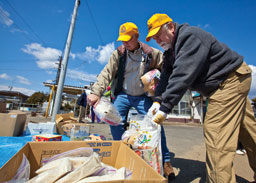
By Steve Summers
Does your church have a process in place to manage the congregation’s safety and welfare as they venture out?
Every year, 330 million people worldwide take a faith-based trip. In preparation, they’re finding a plethora of exciting, stimulating information about their destinations. They’re also finding “life-changing” religious vacation options from a host of Christian sites across the globe, each offering memorable pilgrimages, spiritual journeys, retreats, mission trips, “voluntourism” and cruises.
What they’re not finding is a lot of information on the risks inherent to religious travel today. Many faith-based destinations are in politically troubled places, and terrorism is an ever-present threat. Unfortunately, a dearth of information exists for church leaders who are committed to managing such risks and protecting their traveller groups.
 Putting risk into perspective
Putting risk into perspective
According to the UN World Tourism Organization, the United States is home to about 335,000 religious congregations and places of worship. And, according to National Tour Association, 52 percent of religious-trip travellers book through their churches.
This means church leaders must be aware that they carry a responsibility to keep their travelling members safe.
Our Key Travel 2012 Survey uncovered some alarming findings:
- When traveling abroad, a surprising 24.4 percent of respondents said they’d encountered a serious incident.
- Thirty-eight percent said they hadn’t been made aware of the risk levels associated with a destination or given a pre-trip briefing.
To this end, any reputable travel management company will recommend that those organizing faith-based travel have an up-to-date travel policy — one which includes:
- A set of guidelines that travellers can consult;
- What church members should do if they run into trouble;
- Current information on which countries are safe to visit;
- Which airlines are safe for travel;
- Which hotels are safe for lodging;
- Any current country-specific risks.
Go beyond just a policy
A church’s monitoring of risk factors is vital — before, during and after travel. Emergency procedures need to be set up in advance. In the event of an evacuation, prior briefing, planning, training, and swift, accurate lines of communication can make all the difference in getting travellers back home safely.
Preparation should include details of evacuation routes: the location(s) of the nearest airport(s), safest form(s) of transport, nearest hospital(s) — and, very important, key contact information. For example, if a church member has a worsening medical problem, are there English-speaking doctors in, say, Jordan? Or, if a member’s bag is stolen in Egypt, where would he or she turn?
Enlist technology
A number of technology products and services can assist with traveller welfare and risk management.
iProfile — Designed by award-winning security specialist Maxwell Lucas, iProfile allows users to store medical information, emergency contact details and copies of vital travel documents (passports, insurance policies and visas). This information can be retrieved by users anywhere in the world with Web access.
Existing mobile technology — A range of alerts, reassurances and personal security services can summon help when needed. At the touch of a button, church leaders can send personalized messages to a group of contacts. This also enables travellers to get in touch when they need to say, “I’m OK” or ask for help.
Specialist software — Specialist software looks at travel itineraries and compares them with the latest security and risk information. If a traveller is headed to, or already in, an area where he or she will face a high level of risk, this is automatically reported back to key contacts at the church. Prompt action can then be taken to ensure that suitable contingencies are put in place, and that travellers receive the help they need should an incident occur.
Be forewarned, be forearmed
A church travel organizer wants to be worry- and stress-free on a trip. To ensure this, he or she needs reassurance and peace of mind.
It’s worth any effort to make sure your group of church travellers is well-briefed and prepared, and that contingency plans are in place for their safety and well-being.
Steve Summers is CEO of London-based Key Travel, a global travel management company for non-profits. It offers a range of travel-risk products, all designed to meet the needs of humanitarian and missionary organizations. www.keytravel.com/usa/missionary_travel


